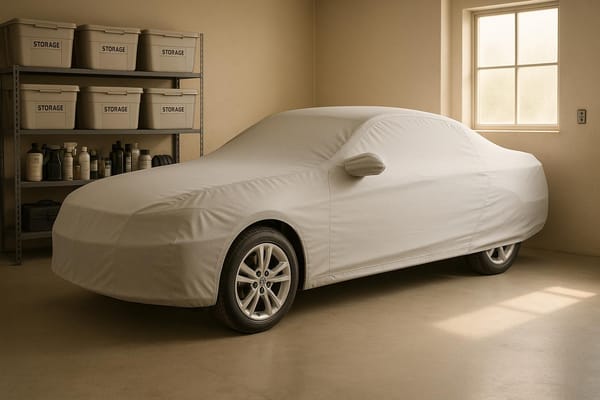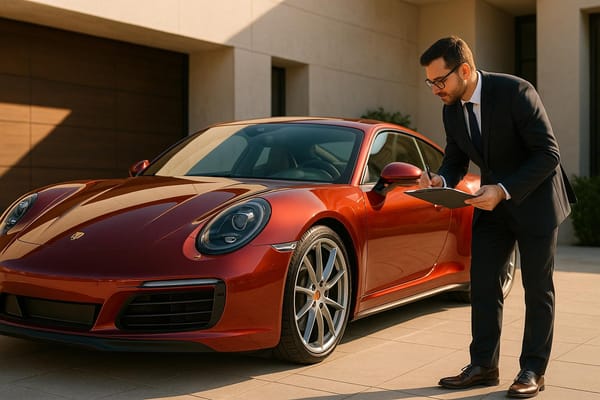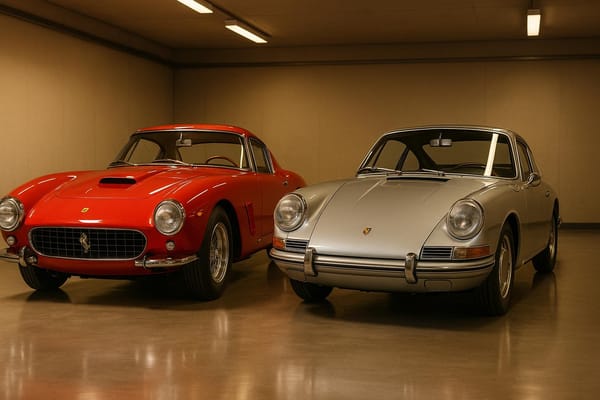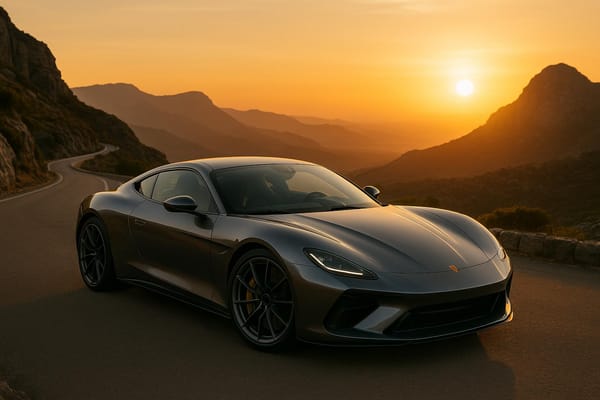How Celebrity Ownership Impacts Car Value
Explore how celebrity ownership can drastically increase a car's value, with key factors impacting auction prices and collector interest.
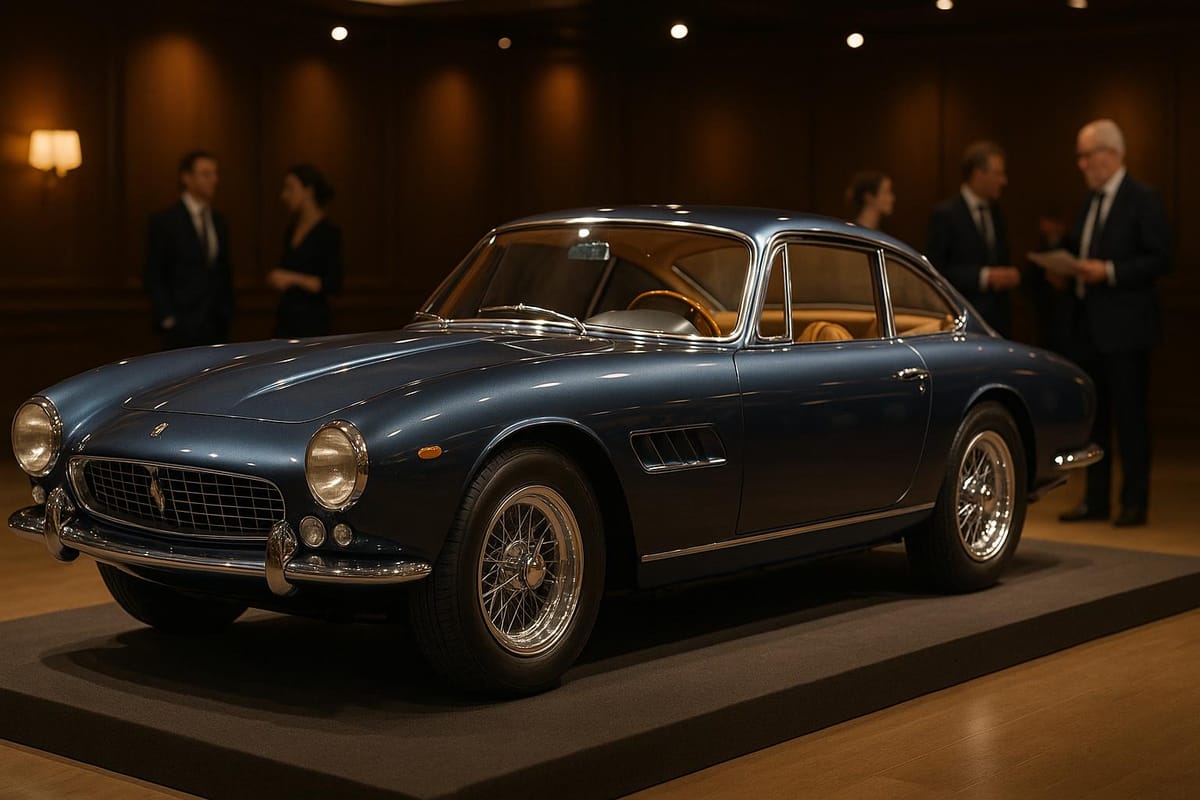
Celebrity ownership can boost a car's value by 100–500% or more. Cars owned by famous individuals, especially those tied to significant moments or customised to their style, attract higher bids at auctions. For example, Diego Maradona's Porsche 911 sold for £575,500 - over four times its standard value. Similarly, Princess Diana's Ford Escort RS Turbo fetched £650,000.
Key Factors Driving Value:
- Celebrity Status: Racing drivers (e.g., Paul Newman) and film stars (e.g., Steve McQueen) create the biggest impact.
- Historical Connection: Cars tied to pivotal events or media appearances fetch higher premiums.
- Documentation: Proof of ownership (e.g., receipts, photos, service records) ensures authenticity and boosts value.
- Timing: Sales during anniversaries or milestones often see higher interest.
Quick Examples:
| Celebrity Vehicle | Sale Price | Premium |
|---|---|---|
| Paul Newman's Porsche 935 | £4.2M | 375% |
| Maradona's Mercedes-Benz 450SLC | £162,127 | 320% |
| Elvis Presley's BMW 507 | £3.8M | 450% |
Proper documentation and expert verification are essential to ensure authenticity and maximise investment potential. Celebrity cars are more than vehicles - they're pieces of history.
What Drives Celebrity Car Premiums
Public Interest and Historical Connection
Celebrity cars often reach extraordinary values, especially when tied to pivotal moments in their owner's life or broader cultural significance. These vehicles become much more than collectible items - they take on the weight of history and emotion, particularly when linked to legendary figures. For instance, cars once owned by Steve McQueen have been known to fetch up to 500% more than their typical value.
This emotional and historical connection plays a significant role in the staggering price differences seen at auctions.
Price Differences at Auction
Auction results consistently highlight the impact of a celebrity's name on a car's value. Some recent sales illustrate just how much these associations can inflate prices:
| Celebrity Vehicle | Sale Price | Premium |
|---|---|---|
| Paul Newman's Porsche 935 | £4.2M | 375% |
| Maradona's 1980 Mercedes-Benz 450SLC | £162,127 | 320% |
| Elvis Presley's BMW 507 | £3.8M | 450% |
Timing also heavily influences these premiums. Cars tend to sell for the most during moments of heightened public interest, such as anniversaries or after significant milestones in the celebrity's career. Additionally, vehicles with detailed ownership records and historical photographs often achieve the highest bids. This combination of celebrity connection and well-documented history appeals to both traditional car enthusiasts and fans of the celebrity, creating a competitive auction environment that drives prices even higher.
The Collector Car Market: Art and Celebrities with RM Sotheby's Head of Auctions, Gord Duff
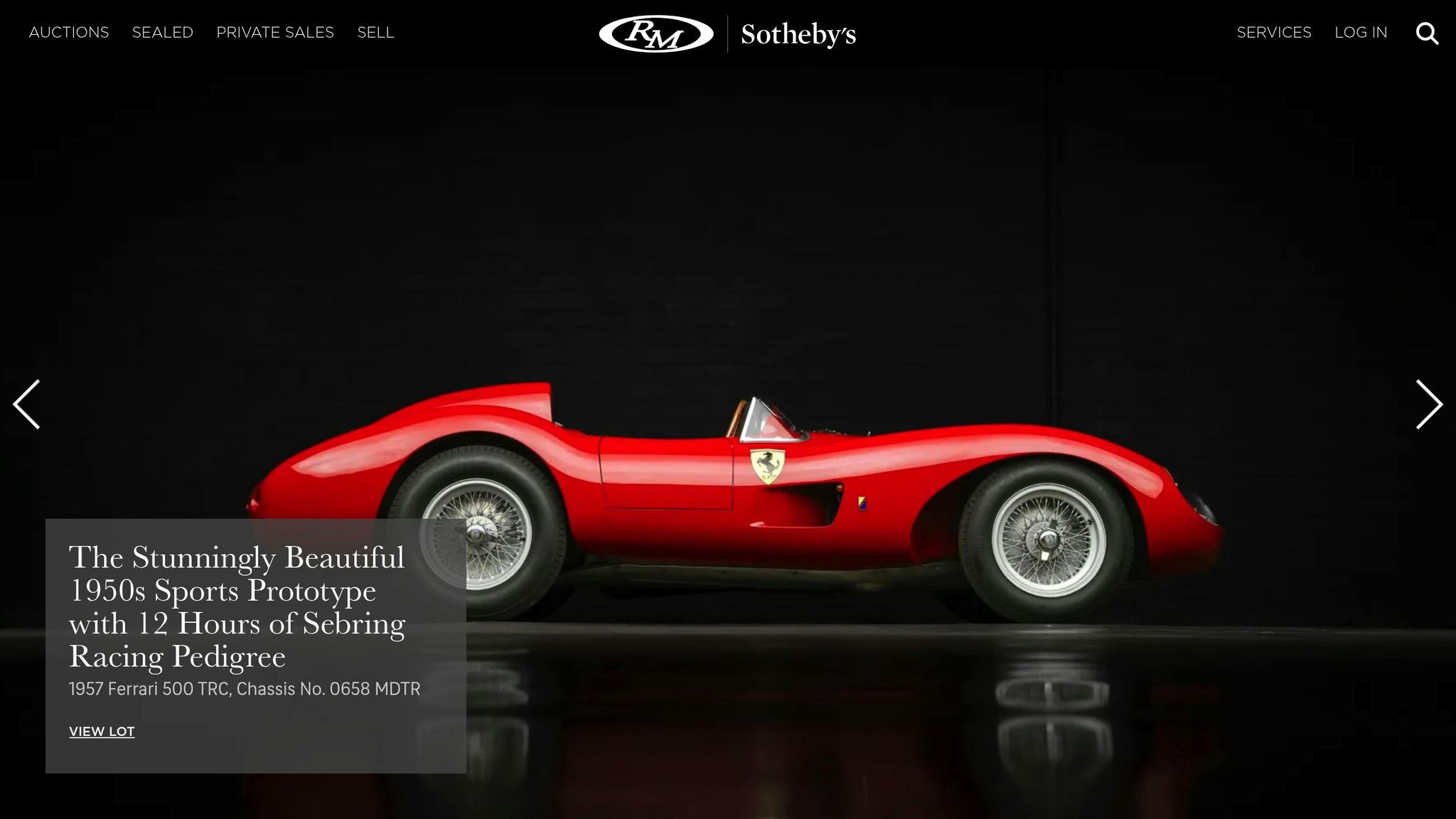
Main Value Factors for Celebrity Cars
Understanding these factors helps explain why a celebrity connection can turn a classic car into a highly sought-after and valuable asset.
Celebrity Status Impact
The level of fame and connection to automotive culture plays a huge role in determining how much a celebrity’s car can fetch. Racing drivers and film stars, in particular, tend to command the highest premiums. For instance, Steve McQueen's love for cars, showcased in movies like Bullitt, has driven up the value of his cars by as much as 500%.
| Celebrity Type | Value Impact | Examples |
|---|---|---|
| Racing Drivers | Very High | Paul Newman (whose cars have set multiple auction records) |
| Film/TV Stars | High | Steve McQueen, Sean Connery |
| Musicians | Moderate to High | Depends on legacy and authenticity |
| Athletes | Variable | Diego Maradona (some of his cars sold for over four times their standard value) |
Next, let’s explore how the nature of a car’s connection to its celebrity owner can further influence its value.
Car's Connection to Celebrity
A car’s history and its association with a celebrity often dictate its market appeal. Vehicles that have appeared in iconic films or significant public events tend to fetch far higher prices than those that were simply owned for a brief period.
Cars with strong celebrity ties often share some key traits:
- They feature in landmark films or significant public appearances.
- They are customised to reflect the celebrity's unique style or preferences.
- They were owned during pivotal moments in the celebrity's career.
- They have been well-maintained over the years.
The story behind the car is vital, and documented evidence is essential to validate these connections. Without proper documentation, even the most exciting story can fall flat in the marketplace.
Ownership Records
Detailed records are the backbone of a celebrity car’s value. Key documents include:
- Original purchase receipts showing the celebrity’s name.
- Registration and insurance papers.
- Service records confirming the car’s ownership history.
- Photographs or videos linking the car to the celebrity.
- Letters of authentication from the celebrity or their estate.
- Expert verification reports.
Take Paul Newman’s 1988 Volvo 740 estate as an example. Thanks to thorough documentation, it sold for an impressive £84,777, even though a standard model would typically be worth just £4,923. That’s a jaw-dropping 17-fold increase! Without those records, the car’s connection to Newman might have been dismissed as mere hearsay, wiping out its premium value entirely.
Good documentation doesn’t just prove the car’s history - it’s the key to unlocking its market potential.
How to Check Celebrity Car History
Research Methods
To confirm if a car was genuinely owned by a celebrity, start by examining its Vehicle Identification Number (VIN). Use official resources like the DVLA or HPI Check to trace ownership changes and verify the car's history.
Here are the key records to focus on:
- Factory build records: These reveal the car's original specifications.
- Registration documents and MOT certificates: Essential for tracking ownership and roadworthiness.
- Service records: Look for maintenance logs from authorised dealerships.
- Period automotive publications: These can provide historical context or spotlight specific vehicles.
- Digital auction house archives: A great source for past sales and ownership details.
Once you've compiled these records, consider professional verification to solidify the car's provenance.
Professional Verification
For a deeper dive into a vehicle's history, hire authentication specialists. These experts can access manufacturer archives and even celebrity estate records. While this service typically costs between £500 and £2,000, it’s often worth it - authenticated celebrity ownership can substantially increase a car's market value.
Warning Signs
When evaluating claims of celebrity ownership, keep an eye out for these potential red flags:
- Ambiguous phrases like "believed to be owned by."
- Documentation that seems too perfect for the car's age.
- Sellers unwilling to allow independent verification.
- Ownership timelines with inconsistencies.
- Suspiciously low asking prices for a supposedly rare vehicle.
"Be particularly wary of claims involving celebrities known for their car collections (like Steve McQueen) without substantial documentation, as these are frequently targeted for fraud due to the significant premium their genuine vehicles command - up to 500% over standard values."
Proper documentation can dramatically enhance a car's value at auction.
Buyer's Guide for Celebrity Cars
Value Growth Potential
When it comes to celebrity cars, their value often skyrockets due to their unique history and connection to iconic figures. Take Freddie Mercury's 1974 Rolls-Royce Silver Shadow, for example - it sold for an astounding £260,534, representing a 3,300% premium over its standard value.
What drives this kind of appreciation? Here are the main factors:
- Cultural significance: Was the car tied to key moments in history or pop culture?
- Media exposure: How often was the car featured in the press or on-screen?
- Ownership history: Are the records complete and verifiable?
- Legacy of the celebrity: Does the celebrity still hold public fascination or influence?
Reducing Purchase Risks
While these cars can be lucrative investments, they also come with risks. To protect yourself, follow these steps:
-
Verify the paperwork:
Make sure you have the original purchase and registration documents proving celebrity ownership. Period photos, media coverage, and service records are also essential. -
Study the market:
Look at recent sales of similar vehicles and check auction trends to ensure you're paying a fair price. -
Get professional validation:
Hire experts to authenticate the car's provenance and confirm all claims are legitimate.
Benefits of MARQHAUS
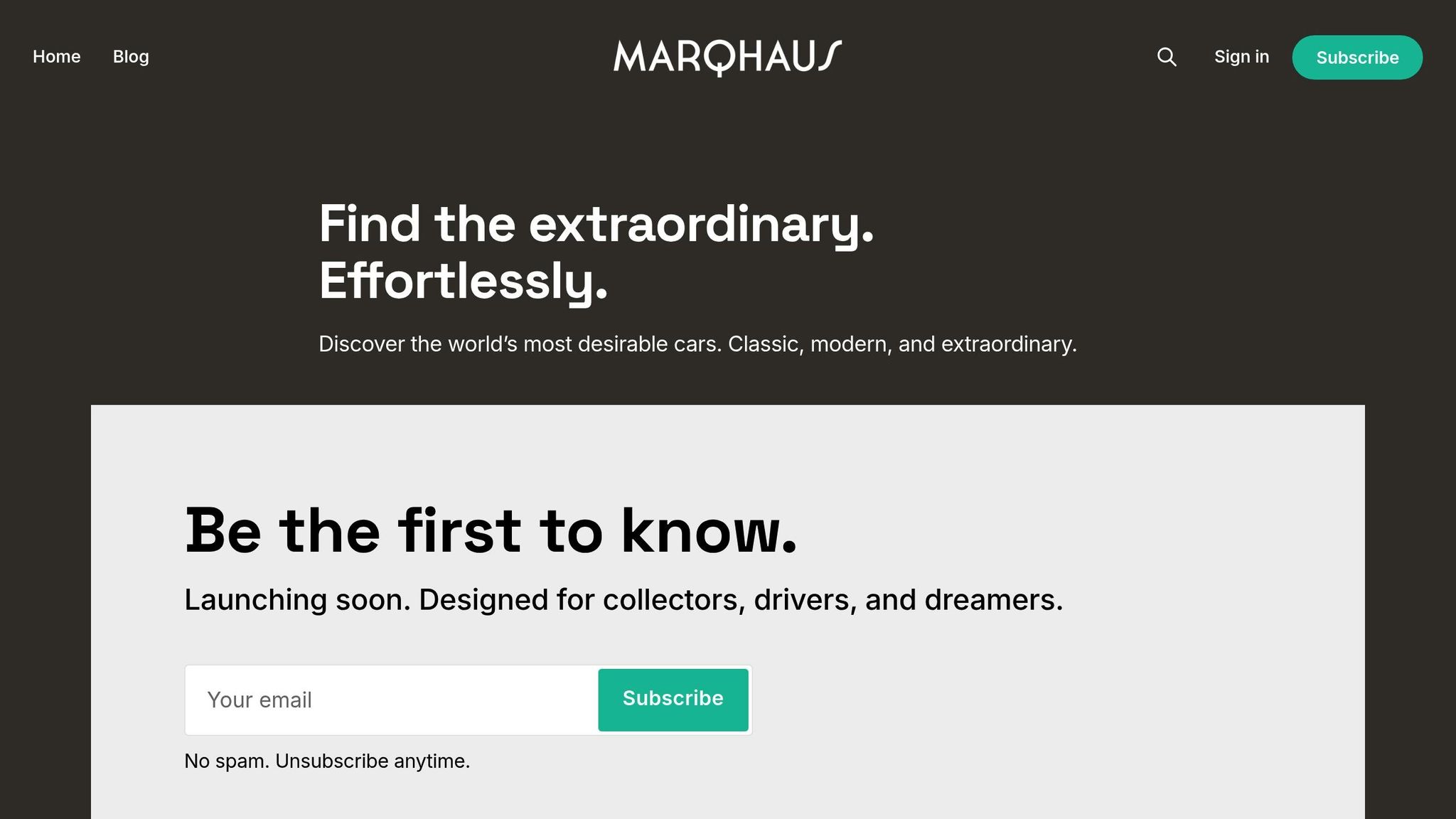
For those looking to invest confidently, MARQHAUS provides a trusted platform with exclusive perks. Members enjoy:
- A curated selection of authenticated celebrity vehicles
- Early access to new listings
- Networking opportunities within a collector community
- Expert advice on investment strategies
Data shows that celebrity ownership can boost a car's value by 100-500% over its standard market price. For instance, Simon Cowell's 1970 Triumph Spitfire sold for nearly six times its normal value, while Jay Leno's former cars collectively achieved a 706% increase above typical market rates.
Summary
Celebrity ownership can drastically increase a car's value, with premiums ranging from 100% to an astonishing 1,200%. Some of the most significant boosts come from vehicles owned by automotive icons and film stars closely tied to car culture - think Paul Newman or Steve McQueen. For instance, Paul Newman's 1988 Volvo 740 estate sold for an impressive £84,777, far exceeding its standard Hagerty valuation of £4,923.
Several key factors drive the investment potential of celebrity-owned cars. Here are the three most critical elements influencing their long-term value:
-
Celebrity Relevance
The enduring legacy of a celebrity plays a major role in maintaining high value. Icons like Steve McQueen continue to command hefty premiums, even decades after their deaths. -
Documentation Quality
Thorough and verified records that establish a car's ownership history significantly enhance its value. Strong documentation of a celebrity connection can increase a car's worth by as much as 500%. -
Historical Significance
Cars linked to pivotal moments or major events often hold additional appeal for collectors.
The market for celebrity-owned vehicles is constantly evolving. Tools like Hagerty's Power List use data-driven methods to quantify the so-called "celebrity effect." These insights not only help buyers make informed investment choices but also highlight the lasting allure of authenticated celebrity provenance in the collector car market.
FAQs
How does celebrity ownership influence the value of rare and classic cars?
Celebrity ownership can add a significant boost to the value of rare and classic cars, especially when the owner is a well-known and admired figure. Vehicles once owned by iconic personalities often hold a special place in history, making them highly sought after by collectors. For instance, a car previously driven by a legendary musician or film star can command a much higher price at auction simply because of its association with their fame.
However, when evaluating how celebrity ownership affects a car's worth, verifying its provenance is crucial. Look for solid evidence like ownership records, photographs, or letters that clearly link the car to the celebrity. Without reliable documentation, the car’s perceived value could easily fall apart under scrutiny. Beyond celebrity connections, collectors should also weigh factors like the car's original condition, rarity, and historical significance to ensure they’re making a smart investment.
How can buyers verify the authenticity of a car previously owned by a celebrity?
To confirm whether a car genuinely belonged to a celebrity, it’s essential to examine its provenance - essentially, the documented history of the vehicle. Start by asking for ownership records, such as registration papers or sale receipts, that explicitly link the car to the celebrity in question. Additional proof, like photographs, media coverage, or signed memorabilia, can add weight to the claim.
It's also a good idea to consult with reputable experts or specialists in rare and classic cars who can verify the vehicle's history. Always ensure any claims are supported by solid documentation to avoid paying a premium for a car without genuine celebrity ties.
Why do cars owned by racing drivers or film stars often hold more value than those owned by other celebrities?
Cars once owned by racing drivers or film stars often fetch higher prices, thanks to their connection to the fame and legacy of these individuals. A racing driver’s car, particularly one linked to their professional achievements, can hold historical value. Meanwhile, a film star’s vehicle is often sought after because it reflects the glamour and intrigue of their lifestyle. These connections make such cars especially appealing to collectors and enthusiasts.
When considering a celebrity-owned car, verifying its history is essential. Look for solid evidence like ownership records, photographs, or even signed memorabilia that can confirm its story. This not only ensures its authenticity but also supports the justification for its higher price tag.

